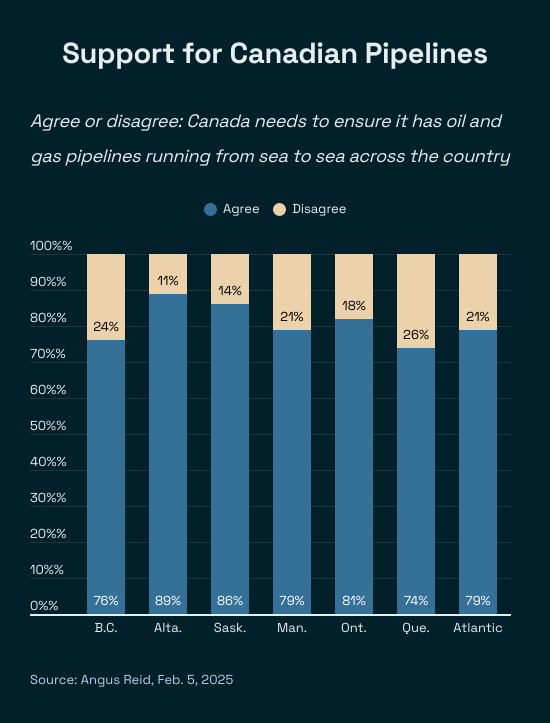A new poll from Angus Reid shows significant support from people in Quebec for Canada to build sea-to-sea oil and gas pipelines.
Gabriel Giguère, a senior policy analyst with the Montreal Economic Institute, says it’s support like he has never seen before.
Here’s what he had to say.
CEC: Where does Quebec get its energy from?
Giguère: Quebec’s electricity comes from local hydroelectric power, while oil and gas primarily come from Canada and the United States. This is a major shift from 2005, when oil was sourced from Algeria, the UK, Norway, Mexico and Venezuela and only a small amount from Canada. Today, it’s almost entirely from Canada and the United States.
CEC: How would an oil pipeline from Alberta benefit the people of Quebec?
Giguère: It’s clear it will help Canadians diversify their trading partners. A pipeline will also create jobs, benefiting Quebec workers.
Quebec is a part of Canada, and unity is essential. The good news is we all seem to agree on that. According to the latest poll from Angus Reid, it’s unanimous. There is broad support for new pipelines to expand our trade relationships.
The United States has been a strong trading partner, but there is ongoing uncertainty that has made diversification essential. We all know that investors don’t like uncertainty. To achieve certainty, we need the right infrastructure to be able to diversify.
In Quebec, twice as many people support a new pipeline than oppose it. I don’t remember having data like that before.
This is a clear and significant shift, especially for the oil and gas sector, which is one of Canada’s most vital economic sectors. This is very good news.
CEC: What has changed that is making Quebecers more supportive of a project like this?
Giguère: I believe the tariff threat was the spark. People are now starting to understand that our trade relationship with the United States isn’t what it once was. It’s as simple as that.
We need to diversify our trading partners. The million-dollar question is: how? I don’t think It’s possible without a pipeline. I believe Quebecers are starting to understand that.
There is the pipeline, but I strongly believe that GNL Quebec [proposed LNG project in the Saguenay Region to transport Alberta natural gas to Europe] could have even stronger public support, as it offers a direct way to diversify our trading partners. This wouldn’t only benefit our European allies but would open doors to other countries also.
CEC: What do you see happening next?
Giguère: It will depend on political leadership in Quebec. When we are talking about pipelines here, the discussion always circles back to Energy East, which was scrapped because there was “no social acceptability.” Nobody can say that today.
It’s not possible to tell me there’s no social acceptability when you have twice as many people who want a pipeline than those who don’t. There is clearly social acceptability.
The real issue is heavy regulation, such as the Impact Assessment Act. To be clear, I’m not saying we should not have any environmental impact assessment, but we need to make sure that the current regulatory framework allows the construction of big energy infrastructure projects.
Political leaders need to recognize that diversifying our trading partners is their responsibility and requires facilitating the projects to make that possible.
The unaltered reproduction of this content is free of charge with attribution to the Canadian Energy Centre.


